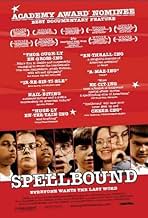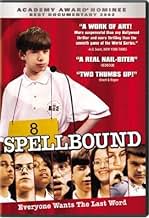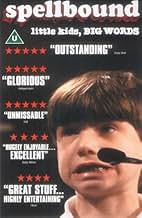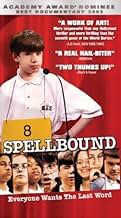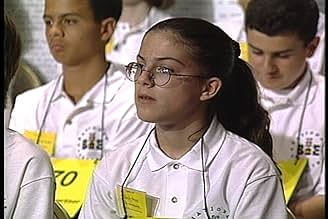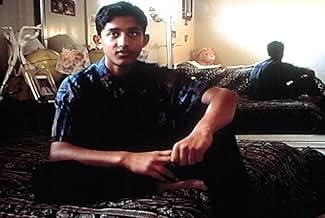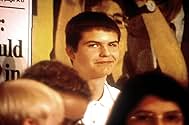IMDb रेटिंग
7.6/10
13 हज़ार
आपकी रेटिंग
अपनी भाषा में प्लॉट जोड़ेंFollows eight teenagers on their quest to win the 1999 National Spelling Bee.Follows eight teenagers on their quest to win the 1999 National Spelling Bee.Follows eight teenagers on their quest to win the 1999 National Spelling Bee.
- 1 ऑस्कर के लिए नामांकित
- 17 जीत और कुल 19 नामांकन
Ubaldo Arenivar
- Self - Angela's Father
- (as Ubaldo)
Jorge Arenivar
- Self - Angela's Brother
- (as Jorge)
Scott McGarraugh
- Self - Ranch Owner
- (as Mr. McGarraugh)
Lindy McGarraugh
- Self - Ranch Owner
- (as Mrs. McGarraugh)
Concepción Arenivar
- Self - Angela's Mother
- (as Concepción)
Neelima Marupudi
- Self - Potter County Champion
- (as Neelima)
Parag Lala
- Self - Nupur's Father
- (as Parag)
Meena Lala
- Self - Nupur's Mother
- (as Meena)
Kuna Lala
- Self - Nupur's Brother
- (as Kuna)
Tim Brigham
- Self - Ted's Brother
- (as Tim)
Earl Brigham
- Self - Ted's Father
- (as Earl)
फ़ीचर्ड समीक्षाएं
When one says that they are excited to see a documentary on the 8th graders' National Spelling Bee, that person is met with a look and an `Oooookaaaay
.' I was on the receiving end of these looks for the last two years when I wanted to see `Spellbound', Jeffrey Blitz's 2002 documentary about the `spelling elite'. I finally got my wish recently and was thrilled that it met (and exceeded) my high expectations for the film.
For `Spellbound', Blitz traveled around the United States and chose eight competitors, aged 11-14, to profile before the eventual climax of the actual spelling bee. We see the home lives of the eight students, who range from poverty to upper middle class affluence, single parent families, and two-parent homes. There are even Archie and Edith Bunker reincarnated as the parents of one girl, and another girl whose parents, though having lived in the United States for over twenty years, don't speak English. Though these students come from fairly different backgrounds, they seem to be treated slightly different because of their intelligence, and therefore descend upon Washington D.C. for the Spelling Bee with a commonality.
`Spellbound' is Jeffrey Blitz's first film and he already exhibits a masterful eye for the documentary genre. Though the profiles are fairly routine, the second half of the film, the Spelling Bee itself, is so compelling that I felt the same effect as your average suspense film. The viewer is naturally led to pick a `favorite', though not guided to any specific child. My `favorite' was knocked out fairly early and I truly felt something. There is nothing fancy about the camera work, there are no stark white backgrounds or a Phillip Glass score, or a reactionary topic. What I felt while watching this film was that I was sitting among the audience and letting the camera be my guide one of the most important elements of a good documentary film.
Whether you think the subject matter isn't worthy of an hour and a half treatment, or didn't notice it in the year of `Bowling for Columbine' (which beat `Spellbound' to win the Best Documentary Oscar for 2003) I would recommend picking up this film. It's heart breaking at times, but mostly, inspirational because some of these kids have more maturity in one arm than a lot of adults I know, and their grace under pressure is both awe-inspiring and something to aspire to.
--Shelly
For `Spellbound', Blitz traveled around the United States and chose eight competitors, aged 11-14, to profile before the eventual climax of the actual spelling bee. We see the home lives of the eight students, who range from poverty to upper middle class affluence, single parent families, and two-parent homes. There are even Archie and Edith Bunker reincarnated as the parents of one girl, and another girl whose parents, though having lived in the United States for over twenty years, don't speak English. Though these students come from fairly different backgrounds, they seem to be treated slightly different because of their intelligence, and therefore descend upon Washington D.C. for the Spelling Bee with a commonality.
`Spellbound' is Jeffrey Blitz's first film and he already exhibits a masterful eye for the documentary genre. Though the profiles are fairly routine, the second half of the film, the Spelling Bee itself, is so compelling that I felt the same effect as your average suspense film. The viewer is naturally led to pick a `favorite', though not guided to any specific child. My `favorite' was knocked out fairly early and I truly felt something. There is nothing fancy about the camera work, there are no stark white backgrounds or a Phillip Glass score, or a reactionary topic. What I felt while watching this film was that I was sitting among the audience and letting the camera be my guide one of the most important elements of a good documentary film.
Whether you think the subject matter isn't worthy of an hour and a half treatment, or didn't notice it in the year of `Bowling for Columbine' (which beat `Spellbound' to win the Best Documentary Oscar for 2003) I would recommend picking up this film. It's heart breaking at times, but mostly, inspirational because some of these kids have more maturity in one arm than a lot of adults I know, and their grace under pressure is both awe-inspiring and something to aspire to.
--Shelly
Doesn't it matter what the words mean more than the letters in them? Wouldn't it do a precocious kid more good to pour over Shakespeare or Jane Austen or Hemingway or even Harry Potter than to turn the pages of a dictionary or be drilled by a parent on how to spell obscure words like "lycanthrope" and "cephalalgia" (or the supremely ironic last word in the final shown here, "logorrhea") which the parents themselves can't even pronounce? When little showoff Harry Altman stumbles and comically grimaces over the word "banns," it seems to me he might be doing better not in the contest, perhaps, but in life to read more books, so he'd become familiar with the custom of "posting the banns," which isn't so obscure as the film and Harry make out, if you've gathered a wide acquaintance with marital customs through reading.
But there is after all a higher significance in all this. America is a self-made country and English in some queer sense is a self-made language, and these general points play into the significance of this surprisingly moving and thought-provoking little film. It's not only the suspense and emotion Spellbound evokes or its fairly tight documentary organization but such more general themes as social mobility and the accessibility of certain sports that make this otherwise conventional movie rise above the ordinary and explain why it's worthy of theatrical distribution and not just a slot on PBS. What would this be like in Italian? That's a language, like some others, whose spellings are so phonetic that a contest like this wouldn't make much sense. But English spellings really don't make much sense. English poses unique problems. The Italian columnist Beppe Severgnini is wrong to have written that it's because we're terrible spellers that spelling bees excite us. An Italian just can't understand. If you say an Italian word, ninety-eight percent of the time (if you're Italian) you know how to spell it. In English, we've got all those tiny vowel differences and remnants of Germanic gutturals and all those endless words from Arabic and Persian and Greek and a hundred other languages that we've transliterated by a hundred different unrelated systems. Why should `Darjeeling,' which so ironically almost stumps the Indian-American Neil Kadakia, be spelled that way and not darjiling or dardjeeling, or who knows what? It's because English spelling had no strict rules till the late nineteenth century; English went through so many growing pains from Chaucer to Shakespeare to Dryden to Jane Austen; because we still have no consistent phonetic system; and because our language has all those endless half-assimilated loan words from other cultures and tongues, that spelling in English is a nightmare and a kind of art, and a truly expert young speller is a real entity worth the chimerical task of seeking him or her out each year.
Spelling bees are a matter of rote knowledge, but success in them can sometimes involve some inspired guessing, and this is shown by the fine tuning contestants are allowed in the DC competition when they ask what language or culture the word comes from. Despite the strong element of memorization, the event attracts and finds ambitious, bright, even rather intellectual kids: lots of hard work maybe, but also some kind of raw brainy talent we don't by any means all have: inspiration and perspiration, the old combination.
The new immigrants in Spellbound are a major force. There are not one but two Indian-Americans in the eight the filmmaker has carefully singled out for special focus, and one of those wins. There's the Mexican girl whose father (so movingly) feels fulfilled, his whole life's journey made worthwhile, just because she has qualified; and he can't even speak English. And there's Ashley, the Black girl from the DC projects who didn't get a trophy or much recognition but dreams, nay prays, to be the winner. And even the boy from rural Tennessee who says there are hardly any other smart kids in his school qualifies as some kind of outsider who magically comes home, and gets put in his place in a complex way, like an Oklahoma valedictorian in the freshman class at Harvard, when he gets to compete in the national spelling bee. .Spellbound itself isn't a profound movie, but it has heart. Like the German WWII film Die Brucke (The Bridge) it shows a group of kids up close and personal and then follows them into battle where one by one they fall, till the last remains, and gets "logorrhea" right (I didn't -- I had to use Spell Check again even though I guessed it right the first time), and becomes champion. And in the emotion of trying so hard and then getting knocked out by one wrong letter, Spellbound illustrates sportsmanship and being all you can be and the joy of competiton and the agony of defeat. It's about poise and maturity and just being a kid. And it's a close, intense analysis of an event a phenomenon, really with more ramifications than we ever realized, till we see it. Spellbound is pretty universal in its appeal and by any accounts it's a wonderful little documentary.
But there is after all a higher significance in all this. America is a self-made country and English in some queer sense is a self-made language, and these general points play into the significance of this surprisingly moving and thought-provoking little film. It's not only the suspense and emotion Spellbound evokes or its fairly tight documentary organization but such more general themes as social mobility and the accessibility of certain sports that make this otherwise conventional movie rise above the ordinary and explain why it's worthy of theatrical distribution and not just a slot on PBS. What would this be like in Italian? That's a language, like some others, whose spellings are so phonetic that a contest like this wouldn't make much sense. But English spellings really don't make much sense. English poses unique problems. The Italian columnist Beppe Severgnini is wrong to have written that it's because we're terrible spellers that spelling bees excite us. An Italian just can't understand. If you say an Italian word, ninety-eight percent of the time (if you're Italian) you know how to spell it. In English, we've got all those tiny vowel differences and remnants of Germanic gutturals and all those endless words from Arabic and Persian and Greek and a hundred other languages that we've transliterated by a hundred different unrelated systems. Why should `Darjeeling,' which so ironically almost stumps the Indian-American Neil Kadakia, be spelled that way and not darjiling or dardjeeling, or who knows what? It's because English spelling had no strict rules till the late nineteenth century; English went through so many growing pains from Chaucer to Shakespeare to Dryden to Jane Austen; because we still have no consistent phonetic system; and because our language has all those endless half-assimilated loan words from other cultures and tongues, that spelling in English is a nightmare and a kind of art, and a truly expert young speller is a real entity worth the chimerical task of seeking him or her out each year.
Spelling bees are a matter of rote knowledge, but success in them can sometimes involve some inspired guessing, and this is shown by the fine tuning contestants are allowed in the DC competition when they ask what language or culture the word comes from. Despite the strong element of memorization, the event attracts and finds ambitious, bright, even rather intellectual kids: lots of hard work maybe, but also some kind of raw brainy talent we don't by any means all have: inspiration and perspiration, the old combination.
The new immigrants in Spellbound are a major force. There are not one but two Indian-Americans in the eight the filmmaker has carefully singled out for special focus, and one of those wins. There's the Mexican girl whose father (so movingly) feels fulfilled, his whole life's journey made worthwhile, just because she has qualified; and he can't even speak English. And there's Ashley, the Black girl from the DC projects who didn't get a trophy or much recognition but dreams, nay prays, to be the winner. And even the boy from rural Tennessee who says there are hardly any other smart kids in his school qualifies as some kind of outsider who magically comes home, and gets put in his place in a complex way, like an Oklahoma valedictorian in the freshman class at Harvard, when he gets to compete in the national spelling bee. .Spellbound itself isn't a profound movie, but it has heart. Like the German WWII film Die Brucke (The Bridge) it shows a group of kids up close and personal and then follows them into battle where one by one they fall, till the last remains, and gets "logorrhea" right (I didn't -- I had to use Spell Check again even though I guessed it right the first time), and becomes champion. And in the emotion of trying so hard and then getting knocked out by one wrong letter, Spellbound illustrates sportsmanship and being all you can be and the joy of competiton and the agony of defeat. It's about poise and maturity and just being a kid. And it's a close, intense analysis of an event a phenomenon, really with more ramifications than we ever realized, till we see it. Spellbound is pretty universal in its appeal and by any accounts it's a wonderful little documentary.
If you need proof that fact is indeed more compelling than fiction, look no further than `Spellbound,' a fascinating and aptly named documentary centered on that great American competition for brainiacs known as the National Spelling Bee.
In designing his film, director Jeffrey Blitz has chosen to focus on eight competitors from widely varying racial, geographical and socioeconomic backgrounds, interviewing them and their families before, during and after the competition. In the first half of the film he introduces us to each of the contestants, giving us behind-the-scenes glimpses into their home lives, their study techniques, their aspirations and their attitudes towards competition and the value of dedication and hard work. The common denominators these eight individuals all share are intelligence, drive, determination and a supportive family structure. Even though the pressure of the experience seems almost too much for any youngster to bear, all of these participants come across as levelheaded, sensible individuals who manage to keep it all in a healthy perspective. The parents, too, seem reasonable in their expectations, encouraging their children without placing undue pressure on them and beaming with justifiable pride at their amazing progeny. Yet, for all their seeming `nerdness' and gift for articulation, Blitz makes it clear that these kids are really just kids (albeit highly gifted ones) after all.
In the second half of the film, we move to the competition itself, watching as all except one of the people we have come to know over the course of the film eventually become eliminated (Blitz had the grand good fortune of choosing the eventual winner as one of his subjects). The scenes at the competition itself provide more edge-of-the-seat suspense than a truckload of fictional Hollywood thrillers. You'll find your mind and heart racing as each child endeavors to spell out the arcane, tongue-tying words chosen by the officials for the competition. Throughout the proceedings, the audience is on as much of an emotional roller coaster as the participants and their families. As a filmmaker, Blitz knows that the human face is really a map revealing what is taking place inside our hearts and minds and this he captures with uncanny precision as the children sweat, tear up, furrow their brows and even in some cases act out their thought processes in humorously absurd muggery while formulating their answers.
`Spellbound' succeeds in its twofold purpose: to honor that commitment to competition that has defined what it means to be an American and to demonstrate that achieving in a competitive field using one's mind can be just as exciting and rewarding as achieving one's greatness on a court, field or gridiron. That's a message all too rarely conveyed by American culture.
Watching this film, you will indeed be spellbound.
In designing his film, director Jeffrey Blitz has chosen to focus on eight competitors from widely varying racial, geographical and socioeconomic backgrounds, interviewing them and their families before, during and after the competition. In the first half of the film he introduces us to each of the contestants, giving us behind-the-scenes glimpses into their home lives, their study techniques, their aspirations and their attitudes towards competition and the value of dedication and hard work. The common denominators these eight individuals all share are intelligence, drive, determination and a supportive family structure. Even though the pressure of the experience seems almost too much for any youngster to bear, all of these participants come across as levelheaded, sensible individuals who manage to keep it all in a healthy perspective. The parents, too, seem reasonable in their expectations, encouraging their children without placing undue pressure on them and beaming with justifiable pride at their amazing progeny. Yet, for all their seeming `nerdness' and gift for articulation, Blitz makes it clear that these kids are really just kids (albeit highly gifted ones) after all.
In the second half of the film, we move to the competition itself, watching as all except one of the people we have come to know over the course of the film eventually become eliminated (Blitz had the grand good fortune of choosing the eventual winner as one of his subjects). The scenes at the competition itself provide more edge-of-the-seat suspense than a truckload of fictional Hollywood thrillers. You'll find your mind and heart racing as each child endeavors to spell out the arcane, tongue-tying words chosen by the officials for the competition. Throughout the proceedings, the audience is on as much of an emotional roller coaster as the participants and their families. As a filmmaker, Blitz knows that the human face is really a map revealing what is taking place inside our hearts and minds and this he captures with uncanny precision as the children sweat, tear up, furrow their brows and even in some cases act out their thought processes in humorously absurd muggery while formulating their answers.
`Spellbound' succeeds in its twofold purpose: to honor that commitment to competition that has defined what it means to be an American and to demonstrate that achieving in a competitive field using one's mind can be just as exciting and rewarding as achieving one's greatness on a court, field or gridiron. That's a message all too rarely conveyed by American culture.
Watching this film, you will indeed be spellbound.
10jotix100
Jeffrey Blitz, the director of this documentary had the bright idea to show us what goes behind the scenes in this competition that some of us only see as a television news clip when it is shown as the last finalist spells the hard word correctly every year in the spring, or inside a newspaper with the picture of the winner.
I didn't get a chance to see it until recently because I thought it was not going to be any good. Since I was attending a screening with a handicapped relative, and all the other films were sold out, we decided to see this one thinking it was going to be empty. Well, as we arrived early, we had our choice seats and slowly, but surely, people started to come in, to the point that all seats were taken!
This was a delightful inside view of what these teen agers go through in preparing for the competition. The kids are so charming and so alive and so much into the spirit of the contest that the viewer has more sympathy for the parents that sit in the audience. They suffer the most because for the contestants, even though it is a prestigious game, they maintain their cool even in the roughest moments.
In a way it also points out to what degree some immigrant parents, especially the Indians that appear in the documentary are involved in their children's school achievements. Year after year the winner is the son or daughter of someone from either India, Pakistan, or another Eastern country that has settled here because of the opportunities these children will have in the United States.
This documentary should be required viewing in schools throughout the country. Both teachers and students should benefit by watching it.
I didn't get a chance to see it until recently because I thought it was not going to be any good. Since I was attending a screening with a handicapped relative, and all the other films were sold out, we decided to see this one thinking it was going to be empty. Well, as we arrived early, we had our choice seats and slowly, but surely, people started to come in, to the point that all seats were taken!
This was a delightful inside view of what these teen agers go through in preparing for the competition. The kids are so charming and so alive and so much into the spirit of the contest that the viewer has more sympathy for the parents that sit in the audience. They suffer the most because for the contestants, even though it is a prestigious game, they maintain their cool even in the roughest moments.
In a way it also points out to what degree some immigrant parents, especially the Indians that appear in the documentary are involved in their children's school achievements. Year after year the winner is the son or daughter of someone from either India, Pakistan, or another Eastern country that has settled here because of the opportunities these children will have in the United States.
This documentary should be required viewing in schools throughout the country. Both teachers and students should benefit by watching it.
Spellbound is a surprisingly moving film, because it is not really about spelling, but about hopes and dreams. There's a lot of love in the film, and it's interesting how different families have different approaches... all the way from hands-off parents to parents hiring drill coaches. The film does a good job of showing the backgrounds of the kids and presenting their personalities. I found myself trying to spell right along with them (unsuccessfully).
Spelling bees promote the worst kind of rote learning, especially when the kids are faced with words they will never use in real life. That's thousands of hours either totally wasted or to be less critical, hours that could have been put to better use, for example, learning creative writing or public speaking. Even so, as one parent says, this is practice to form a habit of perseverance for the future.
The pacing and music were perfect, the way the challenge was presented was clear and straightforward. Excellent film.
Who should see this film:
-- Kids of all ages
-- Everyone else. It's not at all boring.
I'll give Spellbound a perfect 10 out of 10.
Spelling bees promote the worst kind of rote learning, especially when the kids are faced with words they will never use in real life. That's thousands of hours either totally wasted or to be less critical, hours that could have been put to better use, for example, learning creative writing or public speaking. Even so, as one parent says, this is practice to form a habit of perseverance for the future.
The pacing and music were perfect, the way the challenge was presented was clear and straightforward. Excellent film.
Who should see this film:
-- Kids of all ages
-- Everyone else. It's not at all boring.
I'll give Spellbound a perfect 10 out of 10.
क्या आपको पता है
- ट्रिवियाIn 2007, it was added to "IDA's Top 25 Documentaries" of all-time by the International Documentary Association ranked #4.
- गूफ़While interviewing Harry in his room the boom mic is deliberately shown after Harry asks "Is that thing edible?"
- भाव
Harry Altman - Spelling Bee Participant: Does this sound like a musical robot?
- क्रेज़ी क्रेडिटThere is no cast list; a cast member is considered credited if a subtitle or an item in the film prints the name (or partial name).
- कनेक्शनFeatured in The 2003 IFP Independent Spirit Awards (2003)
टॉप पसंद
रेटिंग देने के लिए साइन-इन करें और वैयक्तिकृत सुझावों के लिए वॉचलिस्ट करें
विवरण
- रिलीज़ की तारीख़
- कंट्री ऑफ़ ओरिजिन
- आधिकारिक साइट
- भाषाएं
- इस रूप में भी जाना जाता है
- Завороженный
- फ़िल्माने की जगहें
- उत्पादन कंपनियां
- IMDbPro पर और कंपनी क्रेडिट देखें
बॉक्स ऑफ़िस
- US और कनाडा में सकल
- $57,28,581
- US और कनाडा में पहले सप्ताह में कुल कमाई
- $17,508
- 4 मई 2003
- दुनिया भर में सकल
- $74,57,710
इस पेज में योगदान दें
किसी बदलाव का सुझाव दें या अनुपलब्ध कॉन्टेंट जोड़ें


